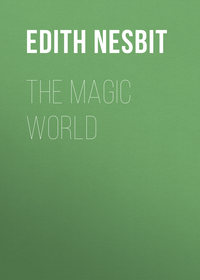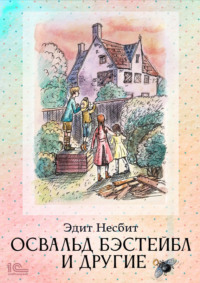 полная версия
полная версияMan and Maid
And now Maisie, for the first time, knew the meaning of home. And before she had been at Yalding a week she had learned to analyse home and to give names to its constituents: love, interest, sympathy, liberty – these were some.
At Yalding Towers Maisie was nothing to any one. No one knew or cared one single little bit of a straw whether she was unhappy or no. Her time was filled, and overfilled, by the attentions exacted by an old, eccentric, and very disagreeable lady. When she put on, for the first evening, the least pretty of the pretty dresses she had brought with her, the old lady looked at her with a disapproval almost rising to repulsion, and said: “I expect you to wear black; and a linen collar and cuffs.”
So another black dress had to be ordered from home, and all the pretty, dainty things lay creasing themselves with disuse in the ample drawers and cupboards of her vast, dreary bedroom.
Her employer was exacting and irritable. When on the third day Maisie broke into tears under the constant flood of nagging, the old lady told her to go away and not to come back till she could control her temper.
“I’ll come back when you send for me, and not before, you hateful old thing!” said Maisie to herself.
And she sat down in her fireless bedroom and wrote a long letter to her mother, saying how happy she felt, and how kind every one was, and what a lovely and altogether desirable place was Yalding Towers. Who shall say whether pride or love, or both, dictated that letter?
When her employer did send for her, it was to tell her, very sharply, that one more such exhibition of sullenness would cost her her situation. So she had to learn to school herself. And she did it. But the learning was hard, very hard, and in the learning she grew thinner, and some of the pretty pink in her cheeks faded away.
Lady Yalding, when she swept in, in beautiful dream-dresses, always spoke to the companion quite kindly and nicely and pleasantly, but there were none of those invitations to come into the drawing-room after dinner which the Family Herald had led her to expect. Lady Yalding was always charming to every one, and Maisie tortured herself with the thought that it was only because she had no opportunity to explain herself that Lady Yalding failed to see how very much out of the common she was. She read Ruskin industriously, and once she left her own book of Browning selections that Edward had given her in the conservatory. She imagined Lady Yalding returning it to her with, “So, are you fond of poetry?” or, “It’s delightful to find that you are a lover of Browning!” But the book was brought back to her by a footman, and the old lady lectured her for leaving her rubbish littering about.
But towards Christmas a change came. Maisie had hoped – more intensely than she had ever in her life hoped for anything – for a few days’ grace, for a sight of her mother, and the mahogany, and the damask curtains, and – yes – of Edward. But the old lady, who really was exceptionally horrid, wondered how she could ask for a holiday when she had only been in her situation six weeks.
Then the old lady went off at half an hour’s notice to spend Christmas with her other daughter – Maisie would have suspected a “row” if Lady Yalding had been a shade less charming – and the girl was left. Thus it happened that Lord Yalding’s brother lounged into Lady Yalding’s room one day, and said: “Who’s the piteous black mouse you’ve tamed?”
“I beg your pardon, Jim?” said Lady Yalding.
“The crushed apple-blossom in a black frock – one meets her about the corridors. Gloomy sight. Chestnut hair. Princess-in-exile sort of look.”
“Oh, that! It’s mother’s companion.”
“Poor little devil!” said the Honourable James. “What does she do now the cat’s away? I beg your pardon – my mind was running on mice.”
“Do? I don’t know,” said Lady Yalding a little guiltily. “She’s a good, quiet little thing – literary tastes, reads Browning, and all that sort of rot. She’s all right.”
“Why don’t you give her a show? She’d take the shine out of some of the girls here if you had her dressed.”
“My dear Jim,” Lady Yalding said, “she’s all right as she is. What’s the good of turning the child’s head and giving her notions out of her proper station?”
“If I were that child I’d like to have a little bit of a fling just for once. The poor little rat looks starved, as though it hadn’t laughed for a year. Then it’s Christmas – peace and goodwill, and all that, don’t you know. If I were you I’d ask her down a bit – ”
Lady Yalding thought – a thing she rarely did.
“Well,” she said, “it is pretty slow for her, I suppose. I’ll send her home to her people.”
“On Christmas Eve? Fog and frost, and the trains all anyhow? Fanny, Fanny!”
“Oh, very well. We’ll have her down, and go the whole hog. Only don’t make a fool of the child, Jim; she’s a good little thing.”
And that was how the dream-dressed Lady Yalding came to sweep into the old lady’s sitting-room – it was as full of mahogany, by the way, as Maisie’s home in Lewisham – and spoke so kindly of Maisie’s loneliness, that the girl could have fallen down and worshipped at her Paris shoes.
When Maisie, in the figured lavender satin that had been her mother’s, swept across the great hall on the arm of the Honourable James, she felt that this indeed was life. Here was the great world with its infinite possibilities.
“How did you get on?” his sister-in-law asked him later.
“Oh, it’s quite a decent sort of little mouse,” he said. “Wants to make sure you see how cultivated it is, quotes poetry – what? – and talks about art. It’s a little touching and all that to see how busy it is putting all its poor little stock in the tiny shop-window.”
Maisie, alone in her room, was walking up and down, trailing the lavender satin, recalling with kindled eyes and red-rose cheeks every word, every look of her cavalier. How kindly he had spoken, yet how deferentially; how he had looked, how he had smiled! At dinner she supposed it was his business to talk to her. But afterwards, when she was sitting, a little forlornly and apart from the noisy chatter of the bright-plumaged house-party, how he had come straight over to her directly the gentlemen came into the drawing-room! And she felt that she had not been wanting to herself on so great an occasion.
“I know I talked well. I’m certain he saw directly that I wasn’t a silly idiot.”
She lay long awake, and, as the men trooped up the stairs, she tried to fancy that she could already distinguish his footsteps.
The letter she wrote to her mother next day was, compared to those other lying letters, as a lit chandelier to a stable-lantern. And the mother knew the difference.
“Poor darling!” she thought. “She must have been very miserable all this time. But she’s happy now, God bless her!”
By the week’s end, every thought, every dream, every hope of Maisie’s life was centred in the Honourable James; her tenderness, her ambition turned towards him as flowers to the sun.
And her happiness lighted a thousand little candles all around her. No one could see the candles, of course, but every one saw the radiant illumination of her beauty. And the other men of the house-party saw it too. Even Lord Yalding distinguished her by asking whether she had read some horrid book about earthworms.
“You’re making a fool of that girl, Jim,” said Lady Yalding. “I really think it’s too bad.”
“My good Fanny, don’t be an adorable idiot! I’m only trying to give the poor little duffer a good time. There’s nothing else to do. The other girls really are – now, you know they are, Fanny – between ourselves – ”
“They’re all duty people, of course,” she said. “Well, only do be careful.”
He was careful. He subdued his impulses to tenderness and gentle raillery. He talked seriously to little Miss Mouse, and presently he found that she was seriously talking to him – telling him, for instance, how she wrote poetry, and how she longed to show it to some one and ask whether it really was so bad as she sometimes feared.
What could he do but beg her to show it to him? But there he pulled himself up short.
“There’s skating to-morrow. We’re going to drive over to Dansent. Would you like to come?”
Her grey eyes looked up quickly, and the long lashes drooped over them. She had read of that trick in a book, and for the life of him he could not help knowing it. Her answer to his question came from a book, too, though it also came from her heart.
“Ah,” she said, “you know!”
Then the Honourable James was honestly frightened. Next day he had a telegram, and departed abruptly. And as abruptly the old lady returned.
And now Maisie had a secret joy to feed on – a manna to sustain her in the wilderness of her tiresome life. She thought of him. He loved her; she was certain of it. Miss Mouse could imagine no reason but love for the kindness he had shown her. He had gone away without a word, but that was for some good reason. Probably he had gone to confess to his mother how he had given his whole heart to a penniless orphan – well, she was half an orphan, anyway. But the days slipped by and he did not come back. All that bright time at Christmas had faded like a picture from a magic-lantern when the slide is covered. Lady Yalding was quite nice and kind, but she left Maisie to the work Maisie was paid for.
Maisie’s mother perceived, through Maisie’s studied accounts of her happiness, more than a glimpse of the reality.
Then, at last, when the days grew unbearable, Maisie wrote to him, a prim little letter with agitated heart-beats between the lines, where he, being no fool, did not fail to find them. Yet he had to answer the letter. He did it briefly.
“Dear Miss Rolleston,” he wrote, “I have received your letter and the little poem, which is very nice. Poems about Spring are the pleasantest kind, I think. – With kind regards, I am yours sincerely.”
It was not, as you may see, worth the heartache with which Maisie watched for it.
It was when she wrote again, and sent more verses, that he decided he must not mince matters.
“Dear Miss Rolleston,” was his second letter, “it is good of you to write again. Now I do hope you won’t be offended with me for what I am going to say. I am so much older than you, you know, and I know you are alone at Yalding, with no one to advise you, so it must be my duty to do it, though, for my own sake, I should, of course, like to advise you quite differently. It was a great pleasure to me to hear from you, but I must not allow myself that pleasure again, even if you were willing to give it to me. It would not be fair to you to let you write any more to a man who is not related to you. Try to forgive me for being unselfish and acting in your interests and not my own.”
And again, with kind regards, he was hers sincerely.
“Poor, pretty little duffer!” he said, as he closed the envelope. “But it’s not real. Don’t I know the sort of thing? She’s simply bored to death down there. And it’s all my fault, anyhow. By Jove! I’ll never try to do any one a good turn again as long as I live. Fanny was perfectly right.”
The letter came by the second post, when Maisie was engaged in drearily reading her employer to sleep after lunch.
It lay on her lap, but she kept her eyes from it and read on intelligibly if not with expression.
The old lady dozed.
Maisie opened her letter. And before she could even have had time to put up a hand to save herself, her Spanish castle was tumbling about her ears. A curious giddy feeling seemed to catch at the back of her neck, the room gave a sickening half-turn. She caught at her self-control.
“Not here. I mustn’t faint here. Not with his letter in my hand.”
She got out of the room somehow, and somehow she got into hat and jacket and boots, put her quarter’s salary in her purse, and walked out of the front door and straight down the great drive that she had come up four months ago with such bright hopes. She went to the station, and she took a train, and she never stopped nor stayed till she was at home again. She pushed past the frightened maid, and, pale and shabby, with black-ringed eyes and dusty black gown, she burst into her mother’s room. The scent of eau-de-Cologne and bees’-wax and buttered toast met her, and it was as the perfume of Paradise. Edward was there – but she was in no mood to bother about Edward. She threw herself on her knees and buried her face in the knitting on her mother’s lap, and felt thin arms go round her.
“It’s nothing. I’m tired of it all. I’ve come home,” was all she said. But presently she reached out a hand to Edward, and he took it and held it, as it were, absently, and the three sat by the fire and spoke little and were content.
To her dying day Maisie will never forget the sense of peace, of enfolding care, and love unchanging and unchangeable that came to her as she woke next morning to find her mother standing by her bed with a cup of tea in her hands.
“Oh, Mummy darling,” she cried, throwing her arms round her mother and nearly upsetting the tea, “I haven’t had a single drop of in-bed tea all the time I’ve been away!”
That was all she found words to tell her mother. Later there was Edward, and she told him most things, but, I imagine, not all. But the mother was content without spoken confidences. She knew that Maisie had suffered, and that now she had her little girl again, to wrap warm in her love as before. This was happiness enough.
This story, I know, is instructive enough for a Sunday School prize. It ought to be tagged at the end with a Moral. I can’t help it: it is true. Of course, it is not what usually happens. Many companions, no doubt, marry Honourable James’s, or even Dukes, and are never at all glad to get home to their mothers and their Edwards. But Maisie was different. She feels now a sort of grateful tenderness for Yalding Towers, because, but for the dream she dreamed there she might never have really awakened – never have known fully and without mistake what it was in life that she truly cared for. And such knowledge is half the secret of happiness. That, by the way, is really the moral of this story.
IX
THE OLD WIFE
“Yes; married by the 30th of June, introduce my wife to the tenants on Christmas Eve, or no fortune. That was my uncle’s last and worst joke; he was reputed a funny man in his time. The alternatives are pretty ghastly either way.”
“Doesn’t that rather depend?” Sylvia queried, with a swift blue glance from under veiling lashes.
Michael answered her with a look, the male counterpart of her own, from dark Devon eyes, the upper lid arched in a perfect semicircle over pure grey. “Yes; but my wife must have a hundred a year of her own in Consols, to protect me from fortune-hunters – lone, lorn lamb that I am!”
Sylvia emphasised the sigh with which she admitted her indigence. Her pretty eyebrows owned plaintively that she, a struggling artist, had no claim against the nation.
“Mary has just a hundred a year,” she said, her voice low-toned as she looked across the room to where, demure in braided locks and grey camlet, her companion sat knitting.
“I daresay,” Michael answered indifferently, following her eyes’ flight and her tone’s low pitch; “but she’s young. I shall advertise for an elderly housekeeper. And qui vivra verra.”
The words, lightly cast on the thin soil of a foolish word-play with a pretty woman, bore fruit.
A week later Michael Wood stood aghast before a tray heaped with letters, answers to his advertisement:
“Housekeeper wanted. Must be middle-aged. The older the better. Salary, £500 a year.”
Not much, he had thought, £500 a year – if, by paying it, he might win a wife who would entitle him to an annual £15,000, whose declining years he might kindly cheer, and whose death would set him free to marry a wife whom he could love. His fancy drifted pleasantly towards Sylvia.
Michael was a lazy man, who bristled with business instincts. He telephoned to the nearest “typewriters’ association” for a secretary, and to this young woman he committed the charge of answering the letters which his advertisement had drawn forth. The answer was to be the same to all:
“Call at 17 Hare Court, Temple, between 11 and 1.”
And the dates fixed for such calling were arranged to allow about fifty interviews daily for the next week or two, for Michael was a bold man as well as a lazy one. The next morning, faultlessly dressed, with carnations in his buttonhole, he composed himself in his pleasant oak-furnished room to await his first batch of callers.
They came. And Michael, strong in his unswerving determination not to forfeit his chance of inheriting the £15,000 a year left him under his mad uncle’s mad will, saw them all, one after the other.
But he did not like any of them. They were old; that he did not mind – it was, indeed, of the essence of the contract. But they were frowsy, too, with reticules of scarred brownish leather, and mangy fur trimmings, worn fringes, and beaded mantles, whence time and poverty had clawed handfuls of the bright beads. Each of them was, as a wife, even as a wife in name, impossible. The task of rejection was softened to his hand by the fact that not one of them could boast the necessary hundred a year in Consols.
The interviews over, Michael, his spirit crushed by the spectacle of so many women anxious to find a refuge at an age when their children and grandchildren should, in their own homes, have been rising up to call them blessed, went to lounge a restorative hour in Sylvia’s bright little studio, and laugh with her over his dilemma. He would have liked to sigh with her, too, but the pathos of the homeless old women escaped her. She saw only the humour of the situation.
“There’s no harm done, if it amuses you,” she said, “but you’ll never marry an old woman.”
“Fifteen thousand pounds a year,” said Michael softly.
Next day more poor old ladies, all eager, anxious, ineligible.
It was on the third day that the old lady in dove-colour came in, sweet as a pressed flower in an old love-letter, dainty as a pigeon in spring. Her white hair, the white lace of her collar, the black lace of her mantle, her beautiful little hands in their perfect, dove-coloured gloves, all appealed irresistibly to Michael’s æsthetic sense.
“What an ideal housekeeper!” he said to himself, as he placed a chair for her. And then an odd thrill of discomfort and shame shot through him. This delicate, dainty old lady – he was to insult her by a form of marriage, and then to live near her, waiting for her death? No; it was impossible – the whole thing was impossible. He found himself in the middle of a sentence.
“And so I fear I am already suited.”
The old lady raised eyebrows as delicate as Sylvia’s own.
“Hardly, I think,” she said, “since your servant admitted me to an interview with you. May I ask you one or two questions before you finally decide against me?”
The voice was low and soft – the voice men loved in the early sixties, before the shrill shriek became the voice of fashionable ladies.
“Certainly,” Michael said. He could hardly say less, and in the tumult of embarrassment that had swept over him, he could not for his life have said more.
The old lady went on. “I am competent to manage a house. I can read aloud fairly well. I am a good nurse in case of sickness; and I am accustomed to entertain. But I gather from the amount of the salary offered that some other duties would be required of me?”
“That’s clever of her, too,” Michael thought; “none of the others saw that.”
He bowed.
“Would you enlighten me,” she went on, “as to the nature of the services you would require?”
“Ah – yes – of course,” he said glibly, and then stopped short.
“From your hesitation,” said the old lady, with unimpaired self-possession, “I gather that the matter involves an explanation of some delicacy, or else – pardon the egotism – that my appearance is personally unpleasing to you.”
“No – oh, no,” Michael said very eagerly; “on the contrary, if I may say so, it is just because you are so – so – exactly my ideal of an old lady, that I feel I can’t go on with the business; and that’s put stupidly, so that it sounds like an insult. Please forgive me.”
She looked him straight in the eyes through her gold-rimmed spectacles.
“You see, I am old enough to be your grandmother,” she said. “Why not tell me the truth?”
And, to his horror and astonishment, he told it.
“And that’s what I meant to do,” he ended. “It was a mad idea, and I see now that if I do it at all I must marry some one who is not – who is not like you. You have made me ashamed of myself.”
A spot of pink colour glowed in her faded cheek. The old lady put up her gloved hand and touched her cheek, as if it burned. She got up and walked to the window, and stood there, looking out.
“If you are going to do it,” she said in a voice that was hardly audible, “I have been used to live among beautiful surroundings – I should like to end my days among them. I do not come of a long-lived family. You would not have long to wait for your freedom and your second wife.”
Never in all his days had Michael known so sharp an agony of embarrassment.
“When must you be married,” the old lady went on calmly, “to ensure your fortunes and estates?”
“In about a month.”
“Well, Mr Wood, I make you a formal offer of marriage, and for reference I can give you my banker and my solicitor – ”
Her voice was calm; it was his voice that trembled as he answered: “You are too good. I can’t see that it would be fair to you. May I think about it till to-morrow?”
The contrast between the old lady’s dainty correctness of attire and speech, and the extraordinary unconventionality of her proposal, made Michael’s brain reel. She turned from the window, again looked him fairly in the eyes, and said: “You will not find me unconventional in other matters. This is purely an affair of business, and I approach it in a business spirit. You would be giving a home to one who wants it, and I should be helping you to what you need still more. I have never been married. I never wished to marry; and when I am dead – Don’t look so horror-stricken. I should not die any sooner because you – you had married me. My name is Thrale – Frances Thrale. That is my card that you have been pulling to pieces while you have been talking to me. Shall I come and see you again at this time to-morrow? It is not a subject on which I should wish either to write or to receive letters.”
He could only acquiesce. At the door the old lady turned.
“If you think I look so old as to make your marriage too absurd,” she said – and now, for the first time, her voice trembled – “I could dye my hair.”
“Oh no,” Michael said, “your hair is beautiful. Good-bye, and thank you.”
As the old lady went down the dusty Temple stairs she stamped a small foot angrily on the worn oak.
“Fool!” she said, “how could you? Hateful, shameless, unwomanly! And it’s all for nothing, too. He’ll never do it. It’s too mad!”
Michael went straight to Sylvia, and told his tale.
“And I felt I couldn’t,” he said; “she is the daintiest, sweetest little old lady. I couldn’t marry her and see her every day and live in the hope of her death.”
“I don’t see why not,” Sylvia said, a little coldly. “She wouldn’t die any sooner because you married her, and, anyway, she can’t have long to live.”
The words were almost those of the little old lady herself. Yet – or perhaps for that very reason – they jarred on Michael’s mood. He alleged business, and cut short his call.
Next day Miss Thrale called again. Mr Wood was sorry to have given her so much trouble. He had decided that the idea was too wild, and must be abandoned.
“Is it because I am too old?” said the old lady wistfully; “would you marry me if I were young?”
“Upon my word, I believe I would,” Michael surprised himself by saying. That it was not the answer Miss Thrale expected was evident from her smile of sudden amusement.
“May I say,” she said, “in return for what, in its way, is a compliment, that I like you very much. I would take care of you, and I shall perhaps not live more than a year or two.”
The tremor of her voice touched him. The £15,000 a year pulled at his will. In that instant he saw the broad glades of waving bracken, the big trees of the park, the sober face of the great house he might inherit, looking out over the smooth green lawns. He looked again at the little lady. After all, he was more than thirty. The world would laugh – well, they laughed best who laughed last. And, after a few years, there would be Sylvia – pretty, charming, enchanting Sylvia. He put the thought of her roughly away. Not because he was ashamed of it, but because it hurt him. The thought that Sylvia should wait for a dead woman’s shoes had seemed natural; what hurt him was that she herself should see nothing unnatural in such waiting.









